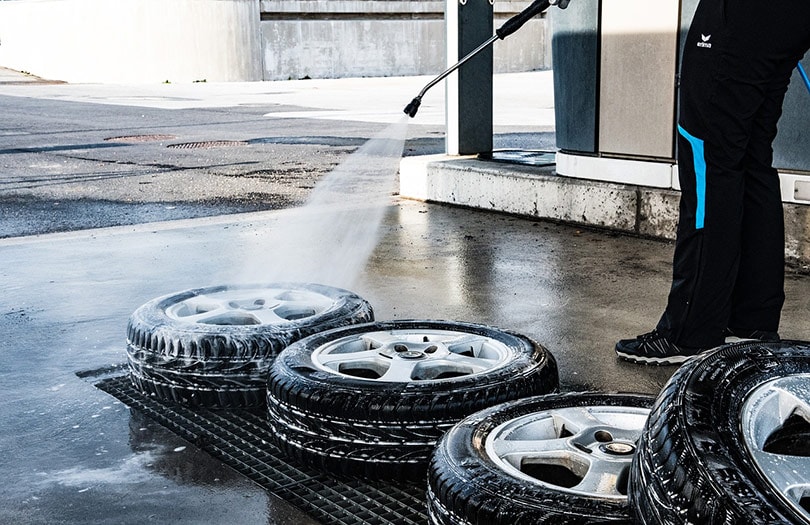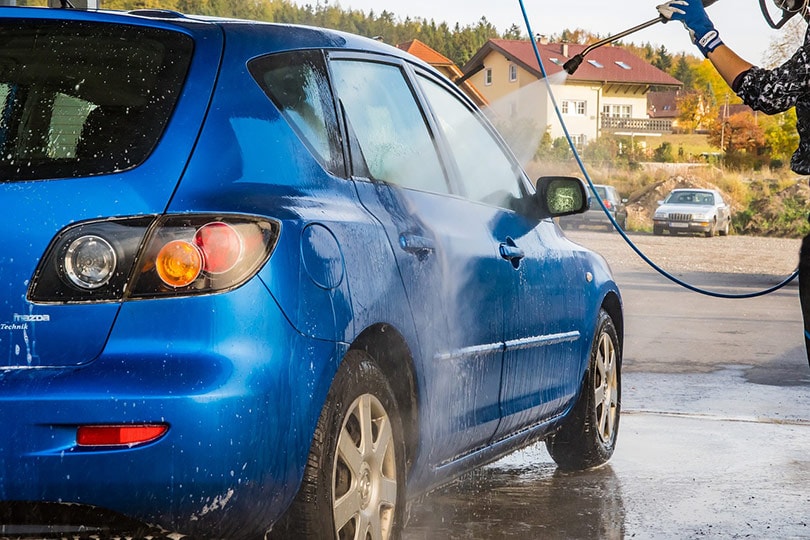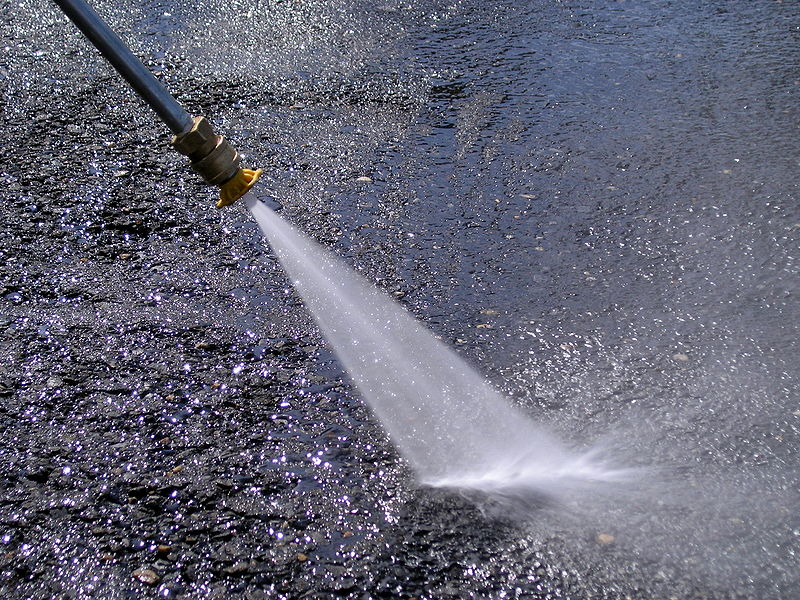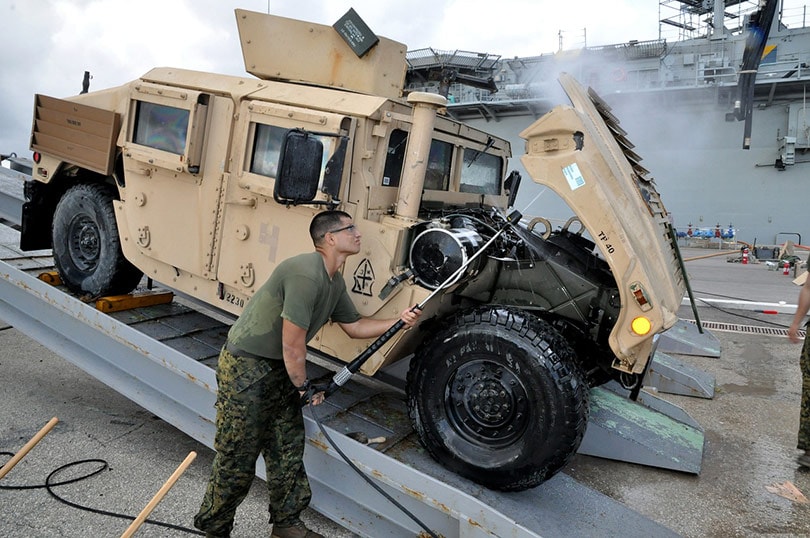10 Pressure Washer Safety Tips for Beginners in 2024
-
- Last updated:


It’s easy to overlook the power of a pressure washer. After all, you’d have a hard time hurting anyone with the spray from your garden hose, and the pressure washer is fed by the same hose. But once that water is pressurized, it can be far more dangerous than most people expect.
The average electric pressure washer produces between 1,600 and 1,800 PSI. Can you guess how much pressure it takes to punch right through human skin? A mere 1,160 PSI. Even an underpowered electric pressure washer will cut through your skin with ease. And how about a gas-powered machine producing pressures in excess of 3,000 PSI? That one can send you to the hospital really quick if you have a lapse in attention.
Our goal is to minimize injuries caused by improper use or accident, so we’ve put together a list of 10 essential tips that will help keep you safe while using your pressure washer.

How Much Damage Can a Pressure Washer Cause?
Before we get into the safety tips, we want to take a moment and discuss just how much damage a pressure washer can cause. A quick slipup could send you to the emergency room in need of dozens of stitches. That’s no exaggeration. Many people underestimate just how powerful pressure washers are, so we’re going to give you a better picture.
As we mentioned, it takes just 1,160 PSI to cut through human skin. But how about something that you’re likely to spray on purpose, such as concrete? Many people use pressure washers to clean parking pads and driveways, but if you’re not careful, a pressure washer can easily damage your concrete. It takes just 1,740 PSI to put a hole in concrete, which is well within the reach of most pressure washers.
What if you’re washing the side of your home and accidentally hit the glass of a patio door or a window? At 1,914 PSI, the window would break. Hopefully, you’re using far less pressure to wash your home!

10 Pressure Washer Safety Tips

Now that we’ve established just how powerful and dangerous pressure washers can be, let’s discuss how to avoid that pressure causing injury or damage. If you follow these 10 tips, you’ll minimize the chances of anyone getting hurt or any property getting damaged.
1. Don’t Point the Nozzle at Anyone
The number one rule of firearm safety is to never point your gun at anyone, and the same is true for the gun of your pressure washer. Don’t ever point it at or even near another person or any part of your own body. If you accidentally hit your foot with the stream, it could easily cut right through your shoe and deep into the flesh of your foot and/or toes. The same could happen if the stream hits anyone.
2. Only Run Gas Pressure Washers Outside
Gas pressure washers are powerful tools that are run by a gasoline engine. They have exhaust systems that release emissions, including carbon monoxide, just like cars, motorcycles, generators, and all other gasoline motors. Carbon monoxide can potentially kill you if you breathe in too much of it. In an enclosed space, the carbon monoxide from the pressure washer’s exhaust will build up with no way to escape, which could result in your death.
3. Always Wear Protective Equipment
You’ve already read about some of the very hard surfaces that a pressure washer can damage. We’re talking about materials that are much harder than you, such as concrete and glass. A small mishap with the spray can cause serious injury. An example we’ve already given is the damage that can occur if you accidentally spray your foot. But you can reduce your risk of injury by wearing the appropriate safety gear. You should be equipped with boots, gloves, pants, safety goggles, and possibly even hearing protection.
4. Pay Attention to Your Surroundings
You should never spray blind. Carefully inspect the area you’re going to spray before you even power up your machine. Make sure there are no hidden outlets or things that are easily damaged. And while you’re working, pay attention to everything that’s going on around you. A pet or person might not know what you’re doing or may not be paying attention and could wander in front of your stream. You need to be the one that’s vigilant and ensures no accidents occur.
5. Be Sure to Use the Correct Nozzle

Different tasks require different tools. There are good reasons why most pressure washers come with an assortment of nozzles. Each nozzle is great for some jobs and poor for others. If you use the wrong nozzle for the job, you could easily damage something that you were just hoping to clean. Ensure you always match the nozzle to the materials you’re spraying.
6. Don’t Operate on a Ladder
Pressure washers operate at pressures in excess of 1600 PSI, and often even greater than 3000 PSI. That’s quite a lot of pressure, though many people still underestimate just how much force that is. But if you’re up on a ladder, you’ll learn quickly as the pressure forces you backward and into a long fall that you can use to think about your mistakes. Seriously, these machines create a lot of force, and if you’re on unstable footing on a ladder, it can easily knock you off.
7. Maintain Your Equipment
Plenty of things can go wrong with a pressure washer, but you can avoid most of them by taking good care of your equipment. For gas pressure washers, a lot more goes into maintenance, including oil changes, filter changes, and even spark plugs. But even electric models have steps you must take to ensure the machine lasts and stays safe. For instance, you’ll want to drain all the water out in the winter so it doesn’t freeze inside the machine. You’ll also need to store the machine out of sunlight. The sun can easily degrade the hoses, leading to a burst hose the next time you hook up your pressure washer.
8. Avoid Electric Shock
This seems like an obvious thing, but many people don’t think about it when they’re actively spraying their pressure washer. While cleaning the exterior of your home, you’ll likely come across power outlets. Make sure you don’t spray them! And also, take care while plugging and unplugging your pressure washer since you’re likely to have wet hands and the area could be wet as well.
9. Read the Manual
It might not be a popular thing to do, but reading the manual for your pressure washer can give you a lot of insight into how the machine works, how to maintain it, and how to best use it safely. Before you run the pressure washer, look through the manual and familiarize yourself with the machine’s operation. This can help to prevent any unfortunate accidents caused by accidental ignorance.
10. Avoid the Red Zero-Degree Nozzle

The pressure coming from your pressure washer depends greatly on the nozzle you’re using. Generally speaking, the tighter the spray, the higher the pressure. In most kits, the red nozzle is the zero-degree nozzle with a very tight pinpoint spray pattern. This is the most powerful nozzle, and you should rarely need to use it. If you’re a beginner, we suggest skipping this nozzle entirely for the time being. It’s very likely to cause injury or damage, even accidentally.

Conclusion
Pressure washers are incredibly useful tools that can help keep your entire property looking like new with just a few hours of work every few months. Anyone can use one of these simple machines, but if you aren’t careful, the high pressure they emit could easily injure a person or damage property. Follow these 10 tips to ensure you’re always enacting safe practices to minimize the risk of injury or damage as much as possible.
Related Read:
- 11 Pressure Washer Before & After Pictures (Extremely Satisfying!)
- How to Start a Pressure Washing Business
- 3 Types of Pressure Washer Pumps
Featured Image Credit: HutchRock, Pixabay
Contents

